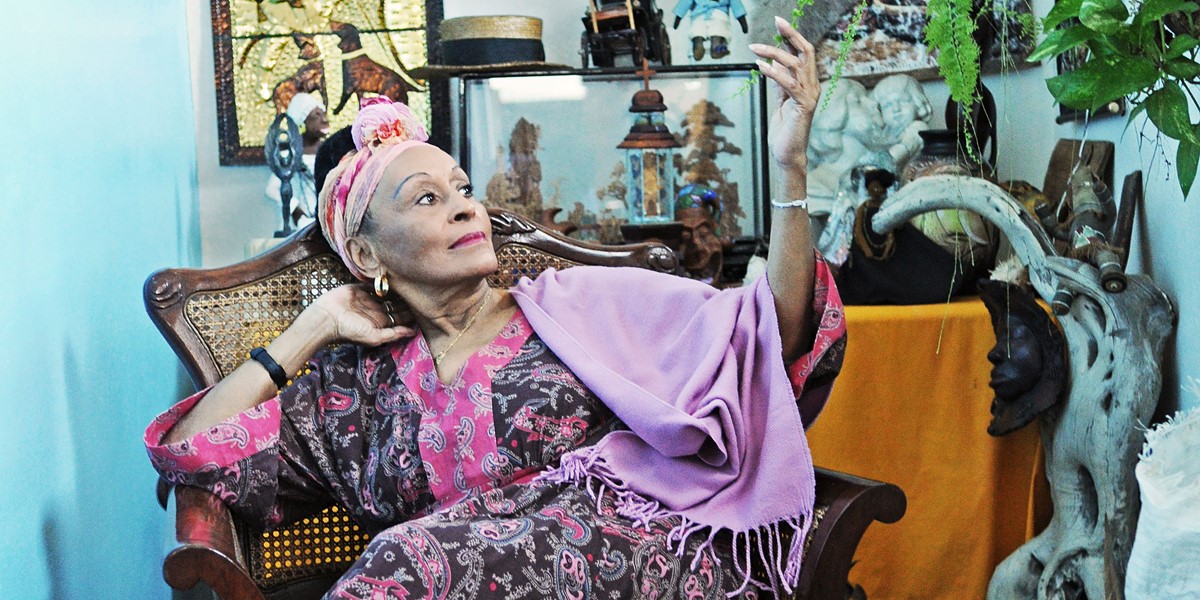Sunday, December 12, 2021
Songlines announces World Pioneer and Newcomer 2021 awards winners
Omara Portuondo and Alostmen have been recognised for their stellar musical contributions at Songlines annual prize-giving summit

Omara Portuondo (©Johann Sauty)
For the second year running, the winners of the prestigious Songlines Music Awards World Pioneer and Newcomer categories have been announced during a ‘virtual’ gong-giving celebration compered by Cerys Matthews, hosting from her own home.
The World Pioneer category is perhaps the acme of the Songlines Music Awards, for it honours not a recent album release but rather an entire lifetime’s contribution to world music. The list of previous winners is a glittering roll-call that includes Island Records’ founder Chris Blackwell, Éthiopiques curator Francis Falceto, Beninese superstar Angélique Kidjo, musical polymath Nitin Sawhney and last year’s posthumous joint-recipients Tony Allen and Hugh Masekela. This year our thinking was led by the cover story of our October 2021 issue (#171), celebrating the 25th anniversary of that remarkable album, Buena Vista Social Club. And so, the recipient of the 2021 Songlines World Pioneer award is BVSC’s still reigning queen, Omara Portuondo.

 While so many of the other Buena Vista Social Club veterans have sadly left us – Rubén González, Compay Segundo, Ibrahim Ferrer and Orlando ‘Cachaito’ López among them – Omara, now 91, is still going strong. Her contribution to Buena Vista Social Club was a magical, timeless version of the classic bolero ‘Veinte Años’, which was recorded in a single take between finishing up sessions for her own album and her imminent departure for a tour of South-East Asia. Had she not had a taxi to the airport waiting outside the studio she would surely have sung more on the album, but she went on to become a central figure in the live BVSC concerts, bringing a tear to the eyes with her moving duet with Ferrer on ‘Silencio’ at New York’s Carnegie Hall, seen in Wim Wenders’ Buena Vista Social Club film.
While so many of the other Buena Vista Social Club veterans have sadly left us – Rubén González, Compay Segundo, Ibrahim Ferrer and Orlando ‘Cachaito’ López among them – Omara, now 91, is still going strong. Her contribution to Buena Vista Social Club was a magical, timeless version of the classic bolero ‘Veinte Años’, which was recorded in a single take between finishing up sessions for her own album and her imminent departure for a tour of South-East Asia. Had she not had a taxi to the airport waiting outside the studio she would surely have sung more on the album, but she went on to become a central figure in the live BVSC concerts, bringing a tear to the eyes with her moving duet with Ferrer on ‘Silencio’ at New York’s Carnegie Hall, seen in Wim Wenders’ Buena Vista Social Club film.
Accompanied by a small combo led by pianist Roberto Fonseca, she elegantly reprised ‘Veinte Años’ on her 2019 farewell tour, Last Kiss, and sent us a clip of her performance as her contribution to our awards ceremony.
Born in Havana in 1930, as a child Omara dreamed of becoming a ballet dancer. But when she found that door closed due to the colour of her skin, she and her older sister Haydée became dancers at Havana’s celebrated Tropicana Cabaret. By the early 1950s the sisters had joined Elena Burke and Moraima Secada to form the vocal quartet Cuarteto d’Aida, touring the US and backing Nat King Cole in Havana.
Omara had just recorded her debut solo album, Magia Negra, when the Cuban Revolution happened. Her sister and her close friend Celia Cruz left the island and settled in the US, but Omara chose to stay put. Since then, she has sung with everyone who is anyone in Cuban music, from Chucho Valdés to Los Van Van. Ry Cooder once told Juan de Marcos González, musical director on the Buena Vista recordings, that Omara was the Cuban Sarah Vaughan. “No,” he corrected him. “Sarah Vaughan was the American Omara Portuondo.”
She became famous as the finest exponent of Cuba’s movimiento filin – the ‘feeling movement’ of singers who interpret lyrics with soulful emotion. “I give my heart, put all the emotions into my singing,” she says when asked to describe the style. By the time Buena Vista happened Omara was in her mid-60s and already the grand dame of Cuban singing. “None of us could ever have imagined that this project was going to be so special,” she says of Buena Vista. “It was a gift to share something so beautiful with friends and musicians that I admire. We were called the Cuban music ambassadors and this is something that you carry with honour.”
At the other end of their career are youthful Ghanaian band Alostmen, winners of the 2021 Newcomer award. Led by Stevo Atambire, the group fuses the grit-encrusted, traditional bluesy sound of the Frafra kologo (two-string fretless lute) from Ghana’s northern region with the hip cosmopolitan vibes of the capital Accra.

 Atambire left his village at 15 and spent six years living on the streets of Accra before he was discovered by Wanlov the Kubolor, a Ghanaian cultural icon, who produced Kologo, Alostmen’s debut international release. Kologo received a five-star review in the April 2021 issue (#166). “We use traditional instruments to bring something authentic and unique to impress the world,” Atambire told Songlines on the release of the album. “You can hear Afro-reggae and blues in this instrument [the kologo], which can entertain thousands of people without a mic or an amplifier. But not all the youth are willing to listen to the same tuning and tones. To keep people entertained you need to bring the kologo to different levels.”
Atambire left his village at 15 and spent six years living on the streets of Accra before he was discovered by Wanlov the Kubolor, a Ghanaian cultural icon, who produced Kologo, Alostmen’s debut international release. Kologo received a five-star review in the April 2021 issue (#166). “We use traditional instruments to bring something authentic and unique to impress the world,” Atambire told Songlines on the release of the album. “You can hear Afro-reggae and blues in this instrument [the kologo], which can entertain thousands of people without a mic or an amplifier. But not all the youth are willing to listen to the same tuning and tones. To keep people entertained you need to bring the kologo to different levels.”
Over the mesmerising strings of his kologo, Atambire sings lyrics about morality and how to live a better life. “I play kologo music to give people hope that if they work hard, they can achieve,” he says. “I preach in a positive way.”
Catch up with the Songlines Music Awards ceremony below:

